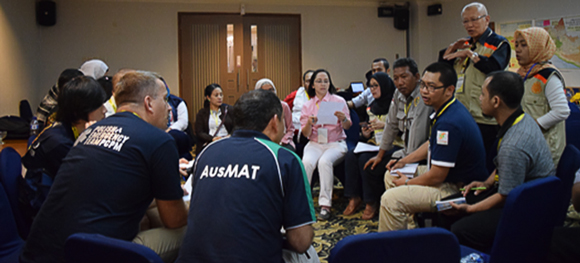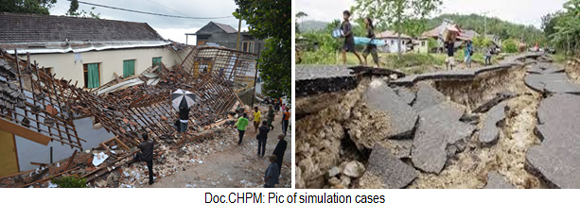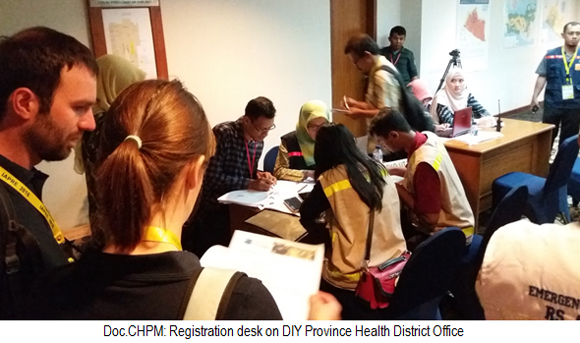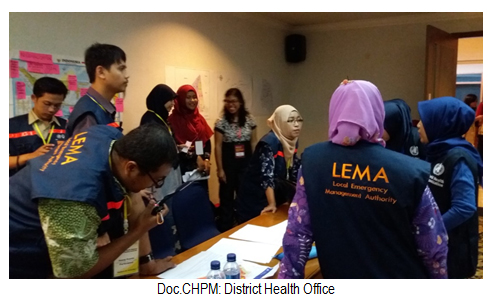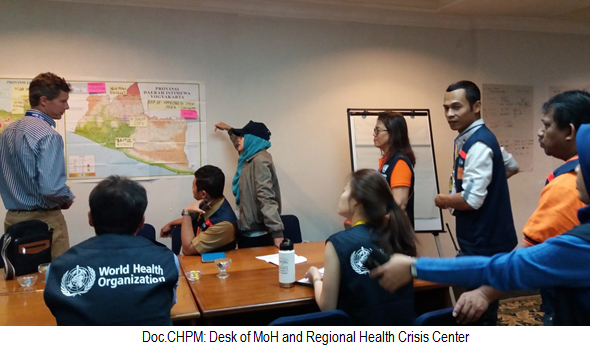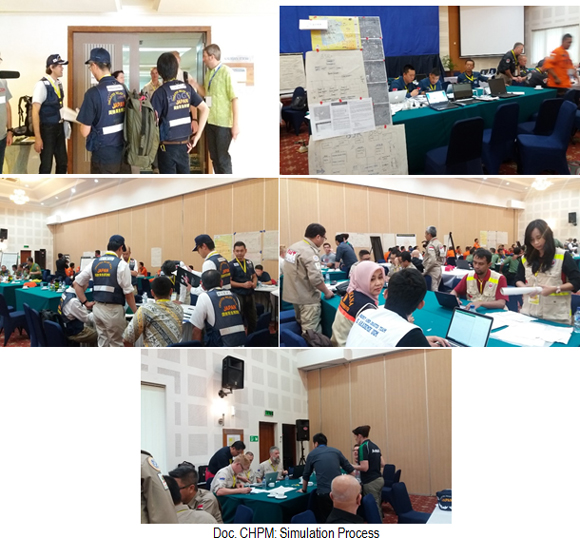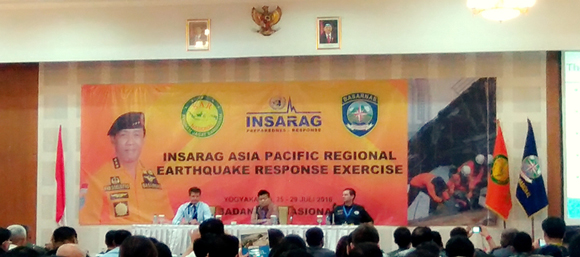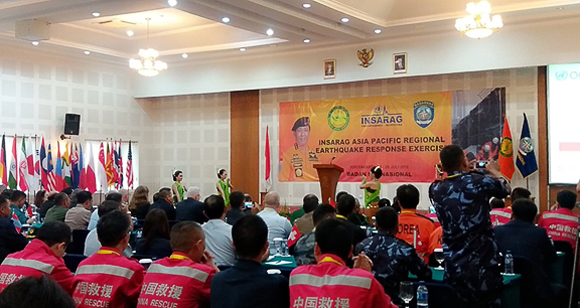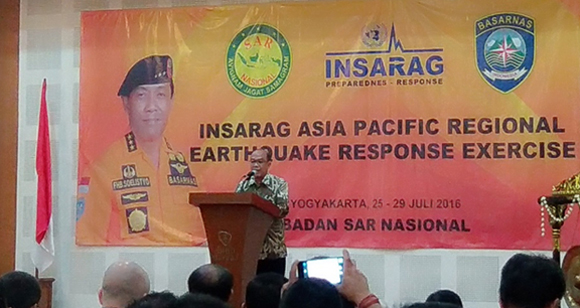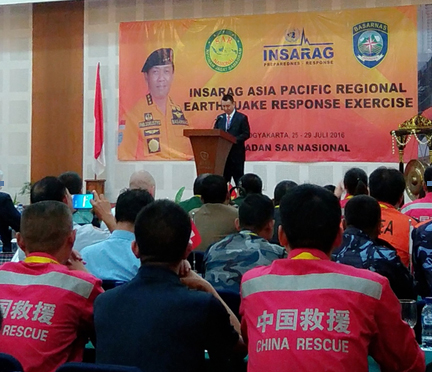Report Day 4: Thursday July, 28 2016
Coverage from the Kalasan Room
Center for Health Policy and Management (CHPM), Faculty of Medicine, Universitas Gadjah Mada-Jogja.
INSARAG ASIA PACIFIC REGIONAL EARTHQUAKE RESPONSE EXERCISE
Yogyakarta, 25-28 July 2016
Simulation Day 2
Simulation of Emergency Medical Team second day was held on Thursday (28 July 2016) from 08:00 AM until 17:00 PM. One of the teams who enthusiastically followed the simulation with members groups from Indonesia, Malaysia and Poland. The team originally headed public health sector, where the situation is 14 days after the disaster, where still many problem, such as water shortage, many emerging disease (malaria, dysentery, diarrhea and others). Then, the team towards sectors A, B, C and D. During the journey to the whole sector, the members do sharing experience.
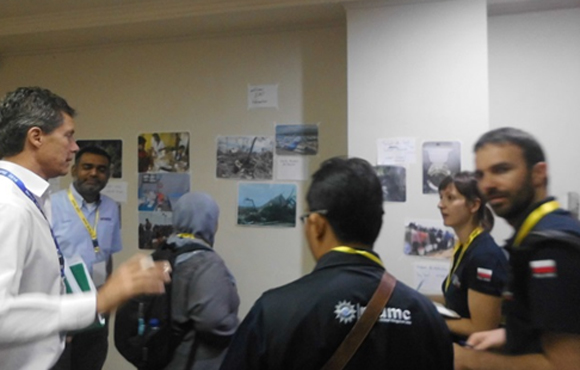
In this group, representatives of Muhammadiyah Disaster Management Center (MDMC) communicating even when disaster happen, many people are waiting in line for free medicines and vitamins from the health post. When in sector B, many of the participants draw the same conclusion, when a disaster occurs, the uniform becomes a problem in itself, because many volunteers who are not in uniform.
Doc. CHPM FoM UGM Participant from Poland
This first task from this simulation on the second day that must be done is to examine the entire sector participants, identify needs and find the best strategy for dealing with victims and disaster management. Besides this, the team must provide feedback to the Ministry of Health in the end of simulation.
After about 30 minutes had passed, all participants sat together again with the Ministry of Health to report a number of obstacles encountered when walking visited many sectors earlier. Ashraf, a participant from Malaysia ask if there are doctors and health workers who provide services illegally, then where to report or what to do? The Ministry of Health confirms the parties, the Ministry of Health will conduct a sweep on the fourth day and will provide escort for health workers illegal.
Representatives of MDMC ask, there have been cases in one of the sectors that the vaccine runs out and there is no vaccine cold chain, then what to do? The Ministry of Health represented by Central Java Regional PPK answered teams MDMC please contact the Yogyakarta Provincial Health Office, if not there, then contact the Ministry of Health directly. Representatives from Airlangga University in the Post asking his case ketamine, antibiotics and adrenaline stolen, one of the concerns raised is that these drugs will be misused by irresponsible people. Ministry of Health to clarify the case of theft of this kind, the Ministry of Health will contact the cluster security (police and military) and it will be investigated.
Participants of the International EMT then asked the volunteers after 14 days at the site, whether local governments still need help and their aid? Ministry of Health states do not require assistance from all of the EMT (national and international) and will activate all health professionals and local health facilities that exist.
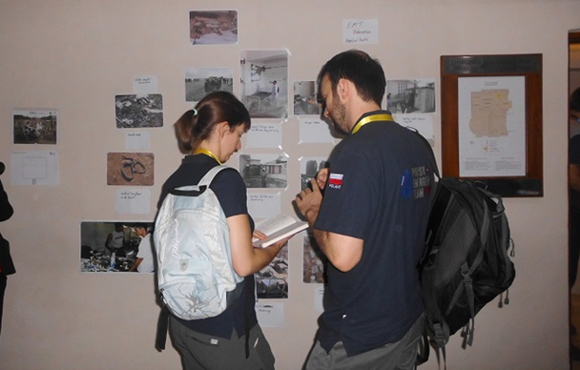
Participants of Yakkum Emergency Unit (YEU) asked if there were any casualties or patients with spinal cord injury, how work arounds? Ministry of Health explained that the patient can be referred to the state-run rehabilitation center in Bantul and Solo. The government will also ask the help of the military and police in the transfer.
Representatives of MDMC back asking if there is a patient with a psychiatric disorder, Should MDMC team to be done? Central Java Regional PPK stated, please contact RS Grhasia Pakem (Sleman) to care for these patients. This is a special hospital for psychiatric disorders.
Question of the representation Panembahan Senopati Hospital is that if there are three bodies that have not been well identified, what to do? The Ministry of Health stated, immediately contact the Department of Health and the local Regional PPK, these two institutions that will connect to the police, where the DVI will help.
After a long discussion and fun, participants take a rest for an hour and then back again to the discussion room. The themes discussed next is a matter of what the final findings of the whole circuit simulation is an emergency medical team. The Ministry of Health stated, there are some crucial matters summarized from many EMT International reporting to the Post Ministry of Health, including: clean water, infrastructure damaged and the limited vaccine.
Thus, the Ministry of Health provides a number of solutions. First, the supply of clean water taps Inside Commander will cooperate in providing them. Then the damaged infrastructure, the Ministry will contact the Ministry of Public Works. Lastly, the vaccine will be promoted and distributed. Closing statement of the Regional PPK is the data from field hospital / emergency no longer exists referred patients.
Harris Kurniawan, SKM as the representative of regional PPK stated simulating international EMT's provide a lot of new experiences, one of which is the management organization of EMT and how to receive and distribute foreign aid to Indonesia, both human resources, as well as other drugs.
Representatives of Poland states, we (EMT international) should have been contact with the volunteers or local NGO before the international EMT dating because of differences in language and culture. In fact, the information related to the disaster area is dominated local volunteers. Representatives from China asserted, international EMT simulation is very useful and hope in the future, we all international volunteers could become one family.
EMT International of China and Japan agreed to, the current constraints EMT team of international is when registering at the local post where when interacting with people in Indonesia who lack good English skills. International EMT China and Japan said they were very stressed at the beginning of his arrival in Indonesia.
Closing statement of the representative of the international EMT is the difficulty of collecting daily reports, what's being done every day for providing services at the site. At the end of the session, the Ministry of Health requested that all international EMT register how many patients who were transferred from the emergency hospital as well as tools, or anything that will be donated to the Indonesian authorities.
Closing INSARAG International Simulation EMT 2016
Closing of the international EMT simulations have been conducted on Thursday, July 28th, 2016 at 16:00 pm at the Inna Garuda Hotel. Delivered closing remarks of the three parties, from INSARAG, UNOCHA and BASARNAS. In addition, the handover keepsake simulation to four volunteers are representatives of China, Indonesia (BASARNAS), ASEAN and Australia Rapid Statement Med. Party UNOCHA stated international EMT simulation is very challenging and fun. UNOCHA also expressed great gratitude for outstanding hospitality BASARNAS.


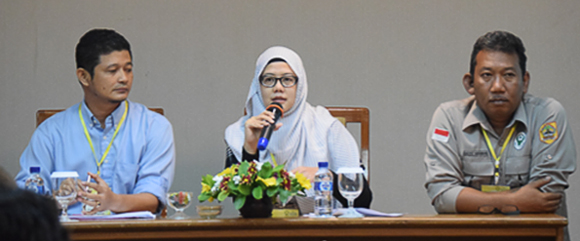
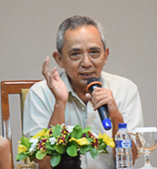 Lesson learnt from Faculty of Medicine, UGM explained by dr. Hendro Wartatmo, Sp. BD. Hendro was lecturer in UGM, a doctor and Disaster Working Group member in FoM UGM. He told about Merapi eruption and Bantul earthquake. Merapi eruption causing mental and physics. It is happen because major explosion would occur in 2006. That’s why preparedness is never enough. We already knew that Merapi always gave us a slowdown lava before.
Lesson learnt from Faculty of Medicine, UGM explained by dr. Hendro Wartatmo, Sp. BD. Hendro was lecturer in UGM, a doctor and Disaster Working Group member in FoM UGM. He told about Merapi eruption and Bantul earthquake. Merapi eruption causing mental and physics. It is happen because major explosion would occur in 2006. That’s why preparedness is never enough. We already knew that Merapi always gave us a slowdown lava before.